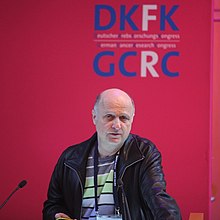Uwe Haberkorn
Uwe Haberkorn (born September 21, 1959 in Dossenheim ) is professor of nuclear medicine at the Ruprecht-Karls-Universität Heidelberg .
Career
Haberkorn attended primary school in Dossenheim from 1965 to 1969. Then he went to the Bunsen-Gymnasium in Heidelberg , where he graduated from high school on May 10, 1978. From 1979 to 1982 he studied philosophy and German at the Ruprecht-Karls-Universität in Heidelberg . From 1982 onwards, Haberkorn studied human medicine at the Philipps University in Marburg . In 1984 he moved to the Julius Maximilians University in Würzburg and in 1985 to Heidelberg. In 1988 he passed the 3rd state examination. In the same year he was the subject of his dissertation "Correlation morphometric and chemical data with ultrasound parameters in human livers" to Dr. med. PhD . Until 1998 he was a scientific assistant at the German Cancer Research Center (DKFZ) in Heidelberg in the oncological diagnostics and therapy department (with Gerhard van Kaick ). Haberkorn received his habilitation on July 4, 1996 . Since 1995 he has been a specialist in nuclear medicine and since April 1, 1998 professor for nuclear medicine at Heidelberg University. He is medical director of the nuclear medicine department and head of the clinical cooperation unit nuclear medicine at the DKFZ. In 2020, Uwe Haberkorn was accepted as a member of the National Academy of Sciences Leopoldina in the Radiology Section .
Scientific focus
Haberkorn works in the field of gene transfer into malignant tumors and on tumor-affine peptides for tumor diagnosis and therapy. He is also working on the non-invasive representation of apoptosis .
Awards
- Mallinckrodt Prize of the German Society for Nuclear Medicine 1996
- 1st prize for contrast agent research from the German Radiological Society 1998
- Erwin Schrödinger Prize 2018
Fonts
- Torsten Kuwert , Frank Grünwald , Uwe Haberkorn, Thomas Krause (eds.): Nuclear medicine. 4th edition. Thieme, Stuttgart 2007, ISBN 978-3-13-118504-4 .
Web links
- Member Post by Uwe Haberkorn at the German Academy of Sciences Leopoldina
- Haberkorn's profile (University Hospital; PDF file; 187 kB)
- Haberkorn's Department (University Hospital)
- List of publications and CV (English; PDF file; 37 kB)
- Anti-cancer molecules as Trojan horses
Individual evidence
| personal data | |
|---|---|
| SURNAME | Haberkorn, Uwe |
| BRIEF DESCRIPTION | German nuclear medicine doctor |
| DATE OF BIRTH | September 21, 1959 |
| PLACE OF BIRTH | Dossenheim |
